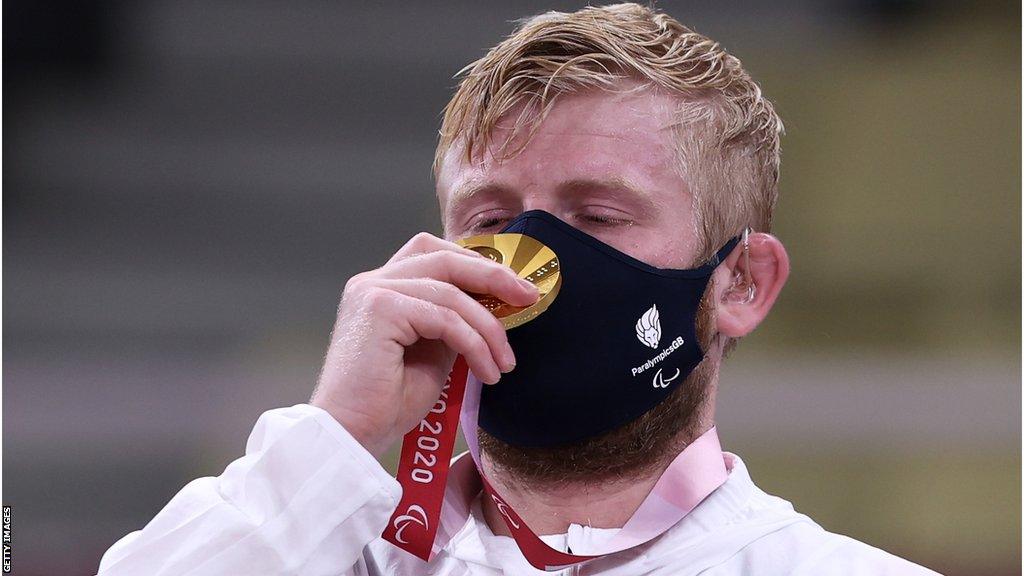GB judo pair Chris Skelley and Jack Hodgson on being friends and rivals
- Published
ParalympicsGB judo duo reflect on competition and friendship
Chris Skelley and Jack Hodgson have gone through a lot over their sporting careers.
Both have come through the British judo ranks together, sharing in the highs and lows of elite sport including two Paralympic Games, plus world and European championships, being roommates while at events, training together and putting the world to rights off the mat and enjoying plenty of laughs on the way.
Now their close friendship is being put to the test by a rule change in the sport which means only one of them will be able to go to next year's Paris Paralympics.
After the Tokyo Games, the sport's governing body, the International Blind Sports Association (IBSA), changed the weight categories in order to include specific events for blind athletes who previously competed alongside those with some sight such as Skelley and Hodgson.
However, the overall number of medals on offer remained the same.
It means that Skelley, who previously competed in the -100kg category, winning a superb gold medal in Japan, and Hodgson, who was in the +100kg event, both find themselves in the +90kg division.
With only one place per nation permitted at the Games, they are now up against each other to finish highest in the world rankings and go to Paris.
"I'm gutted that we are now in the same weight category but when it comes to fighting Jack, he is just another opponent," Skelley, 29, told BBC Sport.
"I have to try to keep a business head on it. We will still be friends but you just have to be able to adapt to the situation and make it work for you.
"I think he brings the best out of me and I think he would say the same.
"We both want the same thing, but whatever happens I know we will support each other and whatever happens, we will be there for each other.
"I will push him to be in the best place possible and he will do the same for me."
The changes have also meant that Skelley has had to bulk up from his natural weight of around 105kg to around 120kg in order to deal with facing bigger fighters.

Skelley started to lose his sight when he was 17, forcing him to end his apprenticeship as a mechanic
He has enjoyed some good results this year and took over the world number one slot from Hodgson, who has been out of action since he suffered a knee injury last year, but is hoping to return this summer with a European Championships in Rotterdam and the IBSA World Games in Birmingham both to come in August.
"When the changes were confirmed, we sat down over a coffee and both said we would be there to support each other," said Hodgson, 26.
"We knew there was nothing we could do about the decision and we wouldn't end our friendship because we were now rivals.
"We shook hands and that was that. One of us would compete, one would not go and the sooner we accepted that it was easier.
"We've put it into a box where we fight like hell on the mat but have a cuddle when it is over."
Both men are based near to the British Judo National Training Centre in Walsall and Hodgson knows he needs good results quickly if he is going to pip Skelley to the Paralympic place.
"Becoming world number one for the first time and then losing it to Chris was tough, not just because it was him but because I had been in good form and I was really happy with the way things were going," he added.
"But it has given me the drive and hunger to get that spot back.
"I haven't got an option but to perform when I get back on the mat because I've missed some key events. If I don't perform, I have no chance of going to the Games."
Great Britain head coach Ian Johns, who has been part of the pair's journeys for many years, understands the rationale behind the changes and is focused on preparing both fighters for the build-up to the Games.
"The decision to change the weights for Paris was done for the right reason and has allowed more blind fighters to come back into the sport," he said.
"It was unfair for blind athletes to compete against those with some vision.
"Yes, it is not good for us, but we just have to go with it and both Chris and Jack have to give it their best shot and get themselves in a position to qualify.
"I have always been proud of them and whoever goes, I will be pleased for them."

From bedroom singer to a UK star: Jason Derulo is on the hunt for an exciting all-around artist
Does it matter which toothpaste you use? Greg Foot puts on a smile to investigate the claims behind different toothpastes
